Invisalign Clear Aligners Boston
Straighten Your Teeth Without Cumbersome Metal

Most adults who want straighter teeth shy away from wearing uncomfortable and noticeable metal braces. But how do you achieve a more attractive smile quickly without enduring a mouth lined with metal? Clear braces like Invisalign in Boston are a wonderful option for many patients — keep reading to learn more about how this treatment works and whether or not you may be a good candidate.
Why Choose Kraft & Schrott Dental Associates for Invisalign?
- Fully Personalized Dental Treatments
- Cutting-Edge, State-of-the-Art Dental Office
- US & European-Trained Cosmetic Dentists
How Does Invisalign Work?
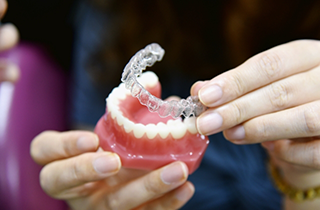
Invisalign uses a series of clear plastic aligners that are customized to fit your teeth at each stage of the treatment as they progressively become straighter.
To begin the process, your dentist in Boston will take a 3D image of your smile and plan your case. Then, an Invisalign lab will create your custom series of aligners specifically for your unique needs. Regular progress checks and a new set of aligners every two weeks will keep you on the path to a fantastic new smile!
Can Invisalign Help You?
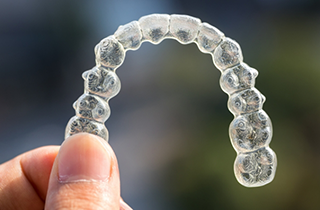
Most patients who are candidates for traditional braces can benefit from Invisalign as an alternative. Teens and adults alike can use Invisalign clear braces. The only way to know for sure is to schedule a consultation with our office.
During this appointment, our team will carefully examine your teeth, take X-rays and photographs of your oral cavity, and put together a treatment plan that will suit you and your smile best. Below are some of the most common orthodontic issues Invisalign can address.
Crowded Teeth
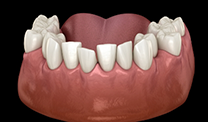
Healthy teeth line up side-by-side in the gumline. When the teeth are too close together, several related issues can develop.
First of all, crowded teeth are difficult to keep clean. Food particles and bacteria can easily build up, increasing your risk of bad breath, gum disease, and tooth decay. Misaligned teeth in general can also lead to teeth grinding and jaw clenching, which places undue pressure on the tooth enamel and can eventually cause it to wear away.
Lastly, there is the overall cosmetic effect to consider -- visibly crowded teeth can often take away from their natural beauty, which may cause you to hide your smile.
Gaps Between Teeth
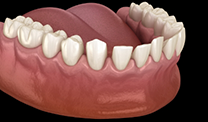
Why do these spaces form in the first place? They might be part of the long-term consequences of certain oral habits early in life, such as thumb-sucking, tongue thrusting, or using a pacifier. They could also have formed if the teeth shifted for any reason. In a few cases, the gaps may simply be a result of having an unusually large frenulum or teeth that are smaller than normal.
Whether or not Invisalign is a good option for you depends in part on how big the gaps are. Smaller spaces can be corrected with cosmetic bonding or porcelain veneers; Invisalign is normally recommended for larger gaps.
Bite Alignment Issues
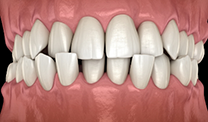
The clear aligners used during an Invisalign treatment will slowly push the teeth toward a more ideal position. This obviously helps correct issues with teeth that are crowded together, unevenly spaced, tilted, or rotated, but such corrections can also help you overcome specific bite issues. Depending on the severity of the problem, Invisalign can often be used to correct:
- Overbite: An overbite describes a situation where the upper teeth come down too far in front of the lower teeth when you close your mouth. Invisalign can adjust the teeth so that they line up properly.
- Underbite: As you might imagine, an overbite is the opposite of an underbite. In this case, it is the lower teeth that are too far in front of the upper teeth, and once again Invisalign can be used to realign them.
- Crossbite: Crossbite occurs when the upper and lower teeth are offset from side to side. Correcting this issue protects the enamel from excessive wear.
- Open Bite: Having an open bite means that the upper and lower arches don’t touch even when your mouth is closed. Invisalign can sometimes be used to correct this issue depending on how severe it is.
The Benefits of Invisalign
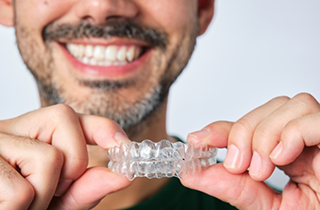
- Virtually Undetectable: It’s very hard to see Invisalign aligners when they’re worn on the teeth, meaning most people won’t even notice them.
- Improved Comfort: The smooth plastic won’t irritate the inside of your lips or cheeks.
- Varied Diet: Braces come with plenty of diet restrictions, but Invisalign aligners can simply be removed when you want to eat.
- Easy Maintenance: The aligners are easy to clean, and they simplify the process of brushing and flossing.
- Fewer Appointments: Invisalign doesn’t require as many appointments since there are no metal brackets or wires to adjust.
How Much Does Invisalign Cost?
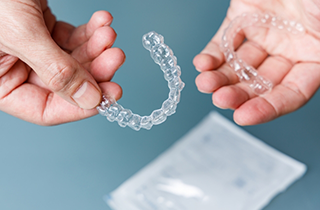
The cost of Invisalign in Boston will largely depend on your situation. For example, do you have more severe misalignment, or just want to make some slight cosmetic changes to your teeth? It’s likely that if you want to address a bite problem, you’ll need to undergo a longer process with more aligners than someone needing to shift a couple of teeth for predominantly aesthetic purposes.
Our team at Kraft & Schrott Dental Associates will outline a detailed estimate of your treatment with you beforehand as well as all of your payment options.
Invisalign FAQs
Will Invisalign Affect My Speech?
As with any oral appliance, your mouth needs time to get used to having Invisalign clear braces on your teeth for most of the day. Whether or not this affects your speech varies from patient to patient. Some may not notice any changes at all while others develop a slight lisp.
However, any speech issues that arise are very slight and tend to disappear within a couple of days. If they persist, it can help to practice speaking with the aligners; for example, you could try reading aloud and repeating particularly troublesome words.
Does Invisalign Hurt?
In comparison to traditional braces, Invisalign is a lot more comfortable. The aligners are made out of smooth plastic that doesn’t irritate the gums or the inside of your lip, and there are no brackets or wires to worry about.
Of course, that doesn’t mean there isn’t any discomfort. Your teeth will likely be sensitive for a couple of days whenever you put more aligners in. This discomfort is actually a good sign! It means that Invisalign is doing its job of gradually moving the teeth to a new position. Said discomfort is very mild and tends to fade relatively quickly over time.
Are There Diet Restrictions with Invisalign?
Since you’ll take the aligners out of your mouth for every meal, you don’t have to worry about damaging your orthodontic appliance while chewing. As such, you can continue to eat all of your favorite foods while undergoing Invisalign treatment. That said, you should still be very careful about what you are putting in your mouth.
If you eat or drink something that’s especially sugary or acidic, it’s important that you either brush your teeth or rinse your mouth thoroughly with water before you put your aligners back in. Otherwise, the potentially harmful substances could become trapped against your teeth for most of the day.
How Often Will I Need Follow-Up Appointments While Undergoing Invisalign?
Traditional braces usually require you to visit your orthodontist or dentist once every month for an adjustment. This isn’t necessary for Invisalign since you’ll simply switch to new aligners once you’ve worn the old ones for a certain period of time. However, you should still visit your dentist in Boston every 6 weeks or so to confirm that the treatment is progressing as planned. Occasionally, we might find that you need to return to an earlier aligner instead of moving on to the next one.
I Need a Checkup & Cleaning I Am Looking for a Dentist for My Child I am Worried About Gum Disease I Have a Cavity or Broken Tooth I am Missing One or More Teeth I Want to Enhance My Smile I am Scared of the Dentist I Have Jaw Pain I am Worried About Sleep Apnea I Have a Dental Emergency View Our Services






